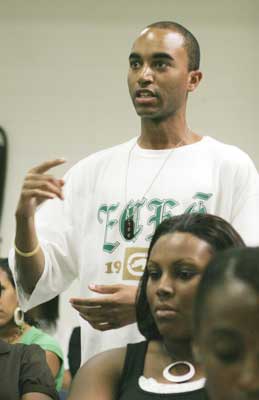
William Alligood
About 100 members of the National Pan-Hellenic Council met Thursday night to discuss the abolishment of the “N word.”
One of the purposes of the discussion, according to Ashlee Canty, NPHC president, was to educate students about the history of the word.
“A lot of times people use the ‘N word’ so frequently and they don’t know the history behind it,” she said. “It’s just important to inform people.”
The council showed a clip of a stand-up comedian, Chris Rock, about the division among blacks. The clip served as stimulant for discussion and conversations about the word, said Keith Powell, interim associate director of the African American Cultural Center.
Lock Whiteside, student chief justice and a senior in political science and social studies education, said the word is sometimes used as a term of endearment among blacks.
“We do refer to each other with that term,” he said. “Me, personally, I don’t like it. The people that are saying it now are not looking at the history behind the word.”
Powell said the word “black” was just as offensive as the “N word” when he was growing up and attributes the use of it today to a cultural shift.
“Now we have cultural shifts and it’s accepted as a cultural pride,” he said. “Words do change and we do have cultural shifts.”
Birnettiah Killens, a senior in psychology, said that blacks as a whole tend to deem themselves as powerless and the culture needs to question if the word empowers them.
“With this word, I challenge everyone to say ‘how does it empower us?'” she said.
Whiteside said he didn’t think the word empowers them.
“It degrades us,” he said. “How do you think [whites] feel when they see us calling each other that word? They think they’re successful. We need to check people on this term.”
Lauren Felder, a participant in the discussion, said she isn’t from North Carolina, but where she’s from they use the word “mully.”
“A lot of people down here don’t know what a mully is. It’s the same thing,” she said. “It’s many other words that’s degrading.”
Powell said when talking about eliminating words, people have to keep in mind the other group of people who will never have the opportunity to have an intellectual conversation at a University.
“We have to keep it in context that many of the people who use the word are oppressed,” he said. “Think about the context of the word. It is a demeaning word in our community.”
Music also has cultural influences, according to Powell. The word “black” shifted from having a negative connotation because of James Brown, he said, and the music today has influenced the use of the “N word.”
“If you want to abolish the ‘N word’, yet the ‘N word’ is generated in most of the music you buy, are you willing to take a step to stop supporting artists who use it?” Powell asked. “Are you? Should you?”
Canty said the program was an informative one.
“The program’s purpose is to inform and educate. It’s not to anger people but more to bring us together to know,” she said.
The NPHC sponsored the discussion as a part of NPHC week, in which all nine nationally recognized historically black fraternities and sororities meet to promote unity among the groups.
The Council was founded in 1931 to promote unity and as a forum for participation and interaction among the members of affiliate organizations and organizations, Canty said.